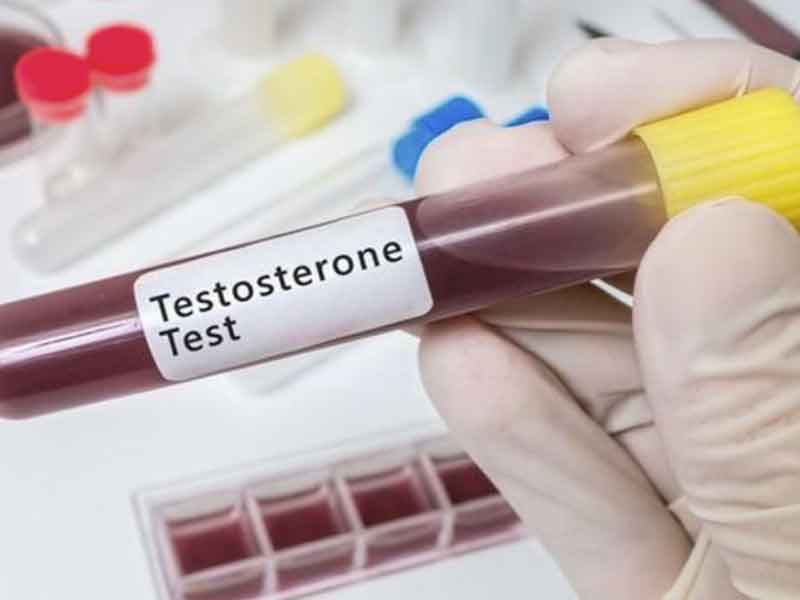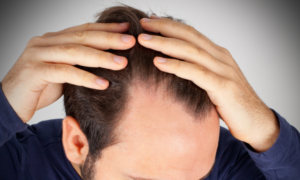Testosterone and hair loss – is it related?

Testosterone and hair loss:
Very often, people who suffer from hair loss, think that it is only linked to genetics or to age. And they even think that the problem is impossible to solve. But it’s wrong ! What if testosterone was partly responsible for your hair loss?
Some hair loss problems are caused by a change of season, stress, diet. but you should also know that for many people, the problem of alopecia is also due to a hormonal imbalance, and it is quite possible to regulate the hormonal balance in order to solve the hair problems that are linked to it.
In this article, we will give you all the explanations and advice.
What is testosterone?
Testosterone is a male hormone secreted by the adrenal glands in both men and women. However, it is found in greater quantities in humans.
Good testosterone levels are associated with sexual performance, reproductive function, maintenance of muscle mass and hair growth.
In humans, it is produced mainly by Leydig cells located in the testicles. And besides, a small part is produced by the adrenal glands (located above each of the two kidneys).
In women, it is synthesized by the adrenal glands and in the ovary.
Hormones and hair loss
In men, 97% of cases of alopecia are linked to hormones such as testosterone, so we speak of alopecia of androgenic origin.
In women, about 20% of hair problems are caused by hormonal imbalance.
The 2 types of hormones that affect hair:
- Androgens (male hormones, including testosterone). Be aware that they can in some cases accelerate the life cycle of the hair and then cause their premature loss.
- Estrogens (female hormones, including progesterone), which contribute to hair growth by prolonging the anagen phase.
It is essential to maintain a good balance between these 2 hormones (androgens and estrogens) in order to maintain a good life cycle of the hair. But this balance can be easily upset at the slightest change in the body or lifestyle.
We therefore find these 2 types of hormones – male and female – in different proportions, both in men and in women.
Testosterone and hair loss

– Hormonal problem and hair loss in men:
Often, alopecia in men is due to a hormonal imbalance.
This comes from the excessive transformation of testosterone into dihydrotestosterone (DHT):
testosterone is transformed by the scalp into DHT, and DHT accelerates the life cycle and therefore aging as well as hair loss by attacking the hair follicle.
It is therefore naturally that the hair becomes thin, fragile, and even comes to no longer grow at all (we then speak of baldness).
– Hormonal problem and hair loss in women:
Women have more estrogen than men, and estrogen promotes hair growth, so women are generally less affected by androgenic alopecia.
On the other hand, during their life, women undergo many hormonal disturbances (menstruation, pregnancy, breastfeeding, weight loss, menopause) and they can therefore also find themselves confronted with hair loss of hormonal origin.
Most often, women notice a thinning of the hair at the temples and around the ears and a loss of density on the top of the skull.
How to stop hormonal hair loss?
It is possible that testosterone is responsible for hair loss. If your alopecia or hair loss is due to a hormonal imbalance or problem, it is first advisable to consult your doctor, who may, after carrying out tests, prescribe anti-androgen drugs.
But it is also important to adopt the right gestures on a daily basis in order to avoid hair loss as much as possible:
- Favor mild shampoos with neutral pH to wash your hair.
- Avoid hair products that degrade the structure of the hair (strippers, relaxers, etc.)
- Regularly massage your scalp with your fingertips to stimulate micro-circulation.
- Adopt a balanced diet on a daily basis to avoid deficiencies in essential nutrients for the hair.
- Limit foods high in cholesterol.
- Avoid stressful situations as much as possible.
How to identify the causes of alopecia?
In order to opt for the most suitable treatment, it is very important to define beforehand the cause of the hair loss. Lack of essential vitamins or nutrients, hormonal problem, imbalance… the causes turn out to be multiple.
So here are some questions to ask yourself:
- Is your hair loss recent?
- Did it come suddenly?
- Does your hair fall out with seasonal changes?
- Have you changed your hair routine lately?
- Did you follow a special diet?
- Are you stressed, or do you feel depressed?
- Have you experienced a particular event recently?
- If the answer to one or more of these questions is: yes, then it is likely that your hair loss problem is only temporary.
However, if you have been suffering from hair loss for more than 4 months despite a good daily lifestyle, we advise you to seek the advice of a professional.
Perform a hormonal balance
Regarding the hormonal assessment, it is targeted according to the suspected disease. Your doctor must provide you with a prescription on which the hormones to be analyzed will be specified.
The hormonal balance must then be carried out in the laboratory, at the hospital or in a clinic.
Medications to slow hair loss (on medical advice):
- Minoxidil 5%: Minoxidil 5% is a solution for skin application. This drug is free access and treats moderate hair loss in men, in other words: androgenetic alopecia. It should not be used in women as it may cause excessive hair growth outside the treated area.
- Alopexy 2%: Unlike 5% Minoxidil, the 2% is recommended for both women and men. Alopexy is a medicine for moderate hair loss in adults. It stabilizes hair loss and promotes regrowth.
- Lobamine cysteine: Lobamine is an over-the-counter medication that treats hair loss in adults. It contains two amino acids: Methionine and Cysteine hydrochloride known to bring strength and vitality to the hair and is administered orally. Lobamine can treat hair loss in both men and women.
- Finasteride: or Propecia, is an anti-hair loss drug that acts directly on male hormones, limiting the conversion of testosterone into DiHydroTestosterone (DHT), responsible for hair loss. Finasteride fights baldness at the root and also stimulates hair regrowth. To be taken orally in a 1mg tablet per day.
_

Dr. Baykal Oymak is a highly esteemed transplant specialist hailing from Turkey, boasting an impressive 17-year tenure in the medical field. His professional journey commenced as a dermatologist at Bogazici Hospital in Istanbul, where he began to hone his expertise. Since then, Dr. Oymak has conducted a remarkable tally of approximately 14,000 triumphant hair transplant procedures within Turkey. Additionally, he holds specialization in PRP treatment and Mesotherapy, further solidifying his reputation as a versatile and accomplished practitioner in the realm of dermatology and transplantation. » SCHEDULE YOUR HAIR TRANSPLANT IN TURKEY HERE «
